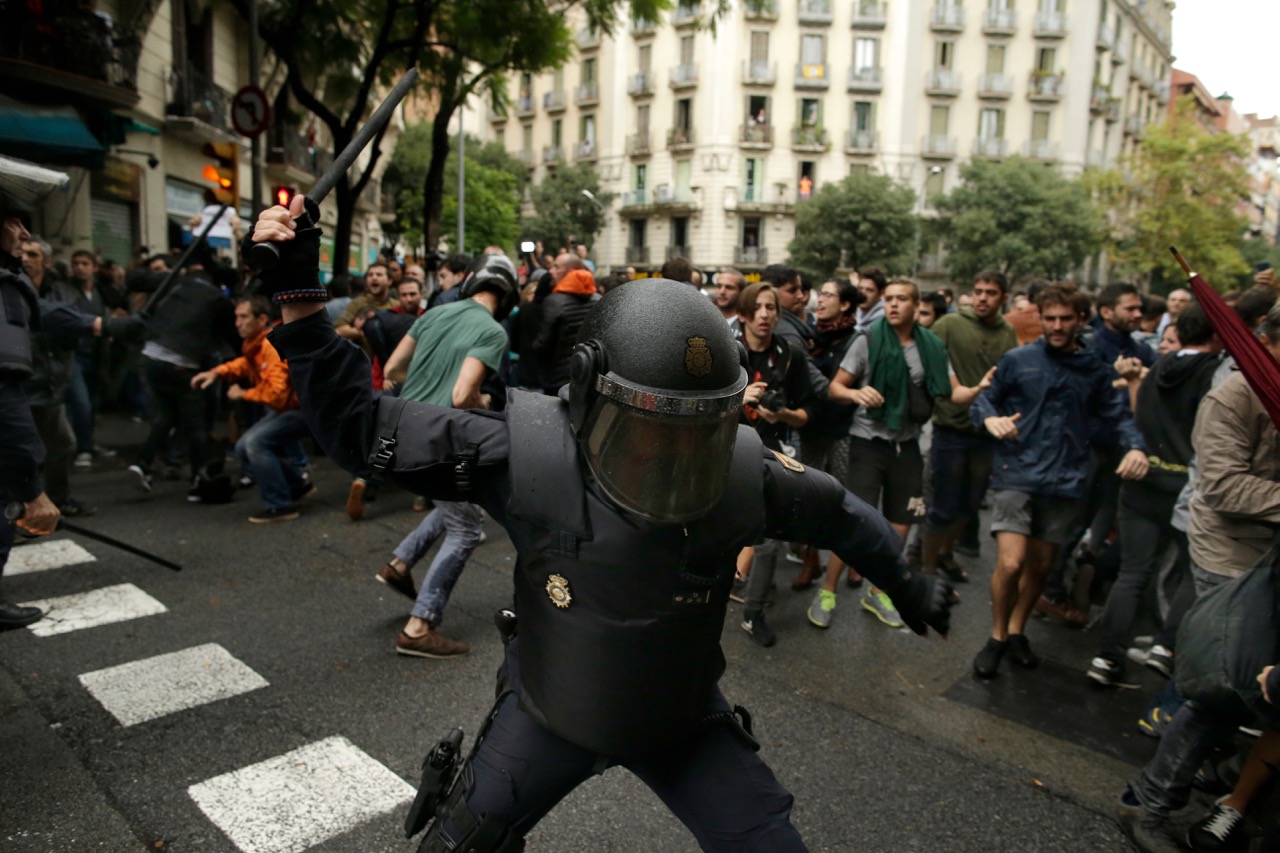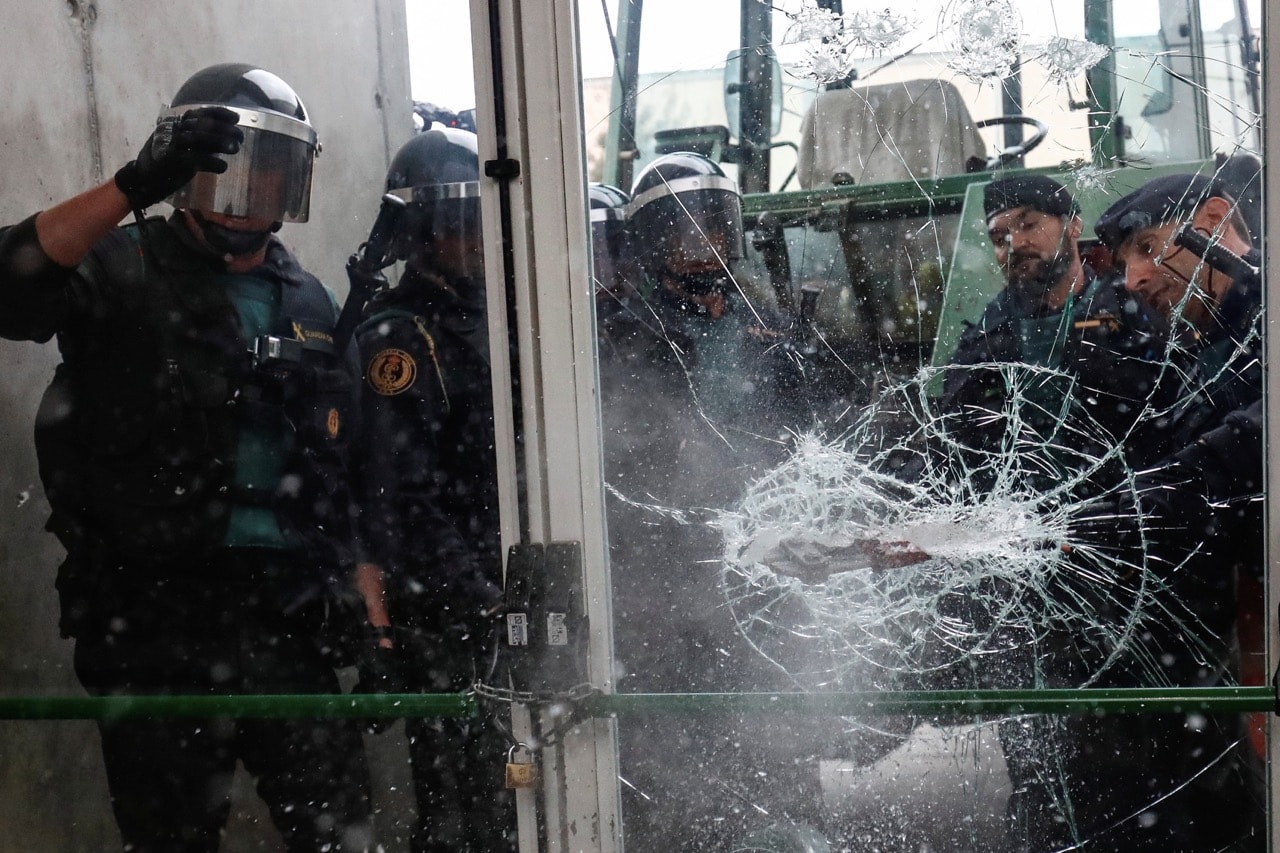A roundup of key free expression news in Europe and Central Asia, based on IFEX member reports.
Spain: Catalonia’s referendum
Brutal, shameful and counterproductive: three adjectives that describe the Spanish authorities’ tactics on Sunday 1 October 2017, as they tried to prevent Catalonia from holding its referendum on independence.
At numerous polling stations across the region, national and military police violently attacked overwhelmingly peaceful crowds which were engaged in acts of civil disobedience. By early Sunday evening, at least 760 people had been injured by the police, some seriously. The police used batons and rubber bullets, the use of which has been illegal in Catalonia since 2014; of the more than 2,000 polling stations across the region, a reported 336 were successfully closed and their ballot boxes seized.
The result of the referendum was announced at the end of the night, with 90% of the 2.2 million votes cast being in favour of separating from Spain.
Although the Spanish Constitutional Court had decided on 6 September that the referendum was unconstitutional, the Catalan Parliament declared it legally-binding. And although few predicted this level of violence, there were ominous signs in September. Throughout the month, the Spanish authorities engaged in very heavy-handed tactics in order to stop the vote. Many of their actions were clear restrictions of the rights to freedom of expression, assembly and access to information.
For example:
At least 12 leaders of the pro-referendum movement – high ranking officials in the Catalan government – were arrested; some of them were charged with ‘sedition’ (which carries a punishment of up to 15 years in jail). At least 712 mayors across Catalonia were summoned for questioning and threatened with criminal charges if they did not cooperate.
Thousands of ballot papers, posters, placards and other pieces of information were seized. At least 5 media outlets were raided by the police, who warned them of prosecution if they ran advertising for the referendum or supported it. Websites providing information about the referendum were shut down and censored.
Before voting day, human rights experts and free speech organisations – including IFEX members – expressed concern about Spain’s use of judicial measures (and its curtailment of basic rights) to resolve what was a political crisis. UN human rights experts David Kaye and Alfred de Zayas issued a statement, saying that “the measures we are witnessing are worrying because they appear to violate fundamental individual rights, cutting off public information and the possibility of debate at a critical moment for Spain’s democracy”; the Electronic Frontier Foundation published a statement condemning the Spanish authorities’ aggressive tactics in attempting to block any online information about the referendum, and specifically their censorship of .cat domains; PEN International criticised the Spanish government’s “use of judicial institutions for political purposes”; the International Federation of Journalists registered the police raids on Catalan media with the Council of Europe’s platform for journalists’ protection and safety; Reporters Without Borders condemned the intimidation of journalists by both sides of the political divide.
On voting day, when police violence was being broadcast around the world, Human Rights Watch released a statement saying that Spain had a duty to protect the right to free expression and assembly, and that force should only ever be employed when necessary and in a proportionate manner.
I spoke to the Catalan MEP Josep Terricabras just after the police had cleared at least two polling stations in Girona. “They acted like fanatics,” he told me: “They cleared the local school using violence. We don’t know what could happen tomorrow – they might even arrest Puigdemont (President of the Catalan government).” For Catalans of his generation, it was all very reminiscent of the not-so-distant past:
After police use batons to clear schools Catalan MEP @jmterricabras told me: ‘I lived under Franco. This is worse because we’re a democracy’ pic.twitter.com/tnDXXXhSAB
— Cathal Sheerin (@CathalSheerin) October 1, 2017
Russia: censorship of LGBTQI, harassment of independent voices
It’s not news that Russia has become increasingly intolerant of dissent (often described as ‘extremism’), or non-conservative views (often described as ‘immoral’), especially in relation to LGBTQI issues. Human Rights Watch reported this month that another activist was charged under the so-called ‘anti-gay propaganda law’ – Evdokia Romanova. Romanova is accused of sharing information on Facebook about the Youth Coalition for Sexual and Reproductive Rights, an international group that advocates for young people’s access to accurate information about health and sexuality. If convicted, Romanova faces a fine and would be the seventh person convicted under the law since it was passed in 2013. This determination to clamp down on positive expressions of non-heterosexual relationships extends to the book industry. The issue of ‘homocleansing’ (removing all traces of positive LGBTQI content from Russian books and Russian translations of foreign books) by Russian publishers is discussed in an article by Ben Steward on the International Publishers Association website.
The journalist Yulia Latynina fled Russia this month following a series of threats and violent attacks on her property. Latynina, who writes for Novaya Gazeta and hosts a weekly radio show on Ekho Moskvy, described the most recent attack – an act of arson on her car – as an “assassination attempt”. The Committee to Protect Journalists has called on the Russian authorities to bring the perpetrators to justice.
The Russian presidential election takes place in March 2018 and the state authorities are already working to cripple the campaign of leading Putin critic Alexei Navalny. Human Rights Watch reported on the pattern of organised harassment directed at Navalny and his supporters. Tactics include police raids on Navalny’s campaign offices and arbitrary detention of volunteer staff. Nationalist and pro-Putin groups have also beaten and threatened campaigners. At the end of the month, Navalny was arrested on his way to an opposition meeting. He filmed part of it on his phone:
Navalny posted a video when police arrived to detain him, as he was preparing to depart for a rally with supporters in Nizhny Novgorod. pic.twitter.com/Nk4g5imE9Y
— RFE/RL (@RFERL) September 29, 2017
Navalny posted the video when police arrived to detain him, as he was preparing to depart for a rally with supporters in Nizhny Novgorod.
France: new anti-terrorism legislation
France’s National Assembly looks likely to pass into law an extremely controversial anti-terrorism bill on 3 October. Human Rights Watch’s Kartik Raj provides a very clear, worrying analysis of exactly how threatening to rights this law could be: “It takes elements of emergency practices – intrusive search powers, restrictions on individuals that have bordered on house arrest, closure of places of worship – that have been used abusively since November 2015 – and makes them normal criminal and administrative practice. It does all this in a way that weakens the judiciary’s control over and ability to check against abuse in the way the new counterterrorism powers are used by prefects, the Interior Ministry’s appointed delegates in each region.” Please see his article for further information.
Reporters Without Borders provides an analysis of the dangers that this legislation presents to journalists who report on terrorism. The increased surveillance and search powers will make it difficult for journalists to exercise their right to free expression and protect confidential sources; vaguely-worded offences such as “coming into regular contact with” individual terrorists, would leave reporters specialising in terrorism investigations open to being hit with a judicial order “confining them to the municipality where they live, forcing them to wear an electronic bracelet and forcing them to terminate all contact with these individuals or organizations.”
Hungary: campaign against civil society
NGOs including the Hungarian Civil Liberties Union (HCLU) have filed an appeal with Hungary’s Constitutional Court against the repressive NGO law passed in June 2017. The law requires NGOs receiving funding from abroad to register as ‘foreign agents’ (as in Russia) and declare this ‘status’ on their websites and publications. Populist President Viktor Orbán has been leading a campaign against civil society for many months and this law is intended to stigmatise NGOs and undermine their work. Another of Orbán’s targets is the billionaire philanthropist George Soros, whose Open Society Foundations fund human rights and democracy projects around the world; this month a pro-government website blacklisted eight allegedly ‘pro-Soros’ journalists.

A Spanish riot police officer swings a baton against would-be voters near a school assigned to be a polling station in Barcelona, Spain, 1 October 2017AP Photo/Manu Fernandez, File
